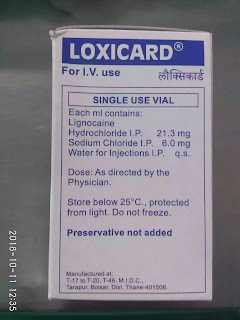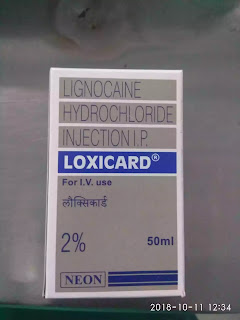Operation Theatre Technologist Guide . In this blog i upload study material for operation theatre technicians , anesthesia technicians , scrub nurse , ot attendants and many more .
Difference between Xylocard , Xylocaine and Xylocaine with Adrenaline
 |
| Xylocard vs Xylocaine vs Xylocaine with Adrenaline |
Xylocard , Xylocaine and Xylocaine with Adrenaline are the different types of preparation of LIGNOCAINE . They have different use , different routes of drug administration and dose .
1. Xylocard ( also known as Loxicard ) :
Xylocard comes in 50 ml vial in the concentration of 2 % .
It is for single use only as there is no preservative .
Routes of drug administration : Intravenous ( I.V. )
Contents :
1. Lignocaine Hydrochloride 21.3 mg
2. Sodium Chloride 6.0 mg
3. water
Use :
1. Xylocard is given before inducing the patient with propofol as it reliefs the pain that is caused by propofol .
2. It is also given in patients with hypertension and heart disease to prevent tachycardia caused by laryngoscopy and intubation .
3. to prevent intra operative arrhythmia .
4. it is also prescribed for ventricular tachycardia with pulse . ( in larger doses as continuous infusion is required in those )
Dose :
4.4 mg/kg body weight
should not exceed (300 mg )
Contraindication :
Stokes-Adams syndrome, or severe degrees of sinoatrial, atrioventricular or
intraventricular block
2. Xylocaine :
 |
| XYLOCAINE |
It contains Methylparaben as preservative so it can be used multiple times
Routes of drug administration : Intramuscular (I.M. )
Contents :
 |
| CONTENTS OF XYLOCAINE |
1. Lignocaine Hydrochloride 21.3 mg
2. Sodium Chloride 6.0 mg
3. Methylparaben 1.0 mg
4. water
Use :
1. It is used as Local Anesthetic to relief the pain from a particular part of the body where any surgical interventions are made .
DOSE : SIMILAR TO XYLOCARD
3. Xylocaine with Adrenaline :
 |
| XYLOCAINE WITH ADR |
Xylocaine with Adrenaline come in 30 ml vial with 2 % preparation .
it can be used multiple times as it also contains methylparaben as preservative .
it also contains Adrenaline which causes vasoconstriction which result in prolong effect , less blood loss and less systemic toxicity .
but it should not be used in end organs like finger , nose tip etc.
Routes of drug administration : USED IN NERVE BLOCKS
IT SHOULD NEVER BE GIVEN THROUGH I.V.
Contents :
 |
| CONTENTS OF XYLOCAINE WITH ADR |
1. Lignocaine Hydrochloride 21.3 mg
2. Sodium Chloride 6.0 mg
3. Methyparaben 1.0 mg
4. Adrenaline bitartrate 0.009 mg ( equivalent to adrenaaline 0.005 mg )
5. Sodium metabisulphite 0.5 mg
USE :
1. it is used in nerve blocks .
Dose :
as it causes vasoconstriction hence less systemic absorption so higher dose can be given .
Lignocaine with adr dose : 7mg/kg body weight ( should not exceed 500 mg )
now as we know this drug also contains adrenaline so we also have drug dose of adrenaline too
which is : 0.2 mg for Normal Patient
0.04 mg for patient with clinically significant cardio vascular disease .
CONFUSED ?????
LET ME CLEAR YOUR DOUBT
AS I HAVE TOLD YOU TWO DRUG DOSE ( of two different drugs ) SO WE WILL APPLY THE CRITERIA OF DOSE BY SEEING THE CONDITION OF PATIENT .
in normal patient maximum dose of Xylocard is applied
where as in cardiovascular disease patient maximum dose of adrenaline is applied .
Contraindication :
1. Not given in ischemic Heart Disease
2. not given in End organs like finger , ear lobe , nose tip etc.
SUMMARY :
1. XYLOCARD IS A DRUG WHICH IS GIVEN THROUGH IV WHERE AS XYLOCAINE CAN NOT BE GIVEN INTRAVENOUSLY .
2. XYLOCARD IS SINGLE USE AS IT DONT HAVE PRESERVATIVE WHEREAS XYLOCAINE AND XYLOCAINE WITH ADR CAN BE USED MULTIPLE TIME AS THEY HAVE METHYPARABEN AS PRESERVATIVE IN THEM .
3. XYLOCARD CAN BE USED IN THE PLACE OF XYLOCAINE BUT XYLOCAINE CANNOT BE USED IN THE PLACE OF XYLOCARD .
Recommended Topics
Label List
- BASIC CONCEPTS (19)
- ANESTHESIA EQUIPMENTS (18)
- Exam (13)
- study material (12)
- MCQ FOR OT TECHNICIANS (11)
- ANESTHESIA PREPRATION (10)
- DEVICES USED IN OT (7)
- random topics (7)
- CSSD & OTHER DEVICES (6)
- FIND A JOB (5)
- QUESTION PAPERS (5)
- latest updates (4)
- DRUGS (3)
- PATIENT CARE (3)
- Registration (3)
- Surgical Instruments (3)
- History of Anesthesia (2)
- by - Ritika Sharma (1)



Post a Comment
Post a Comment